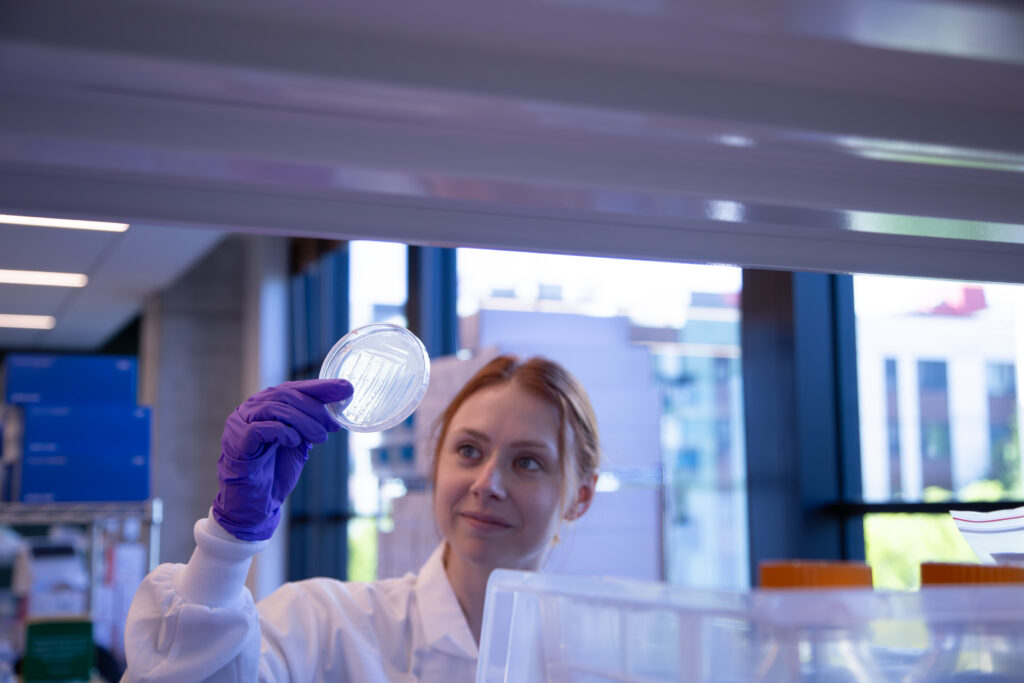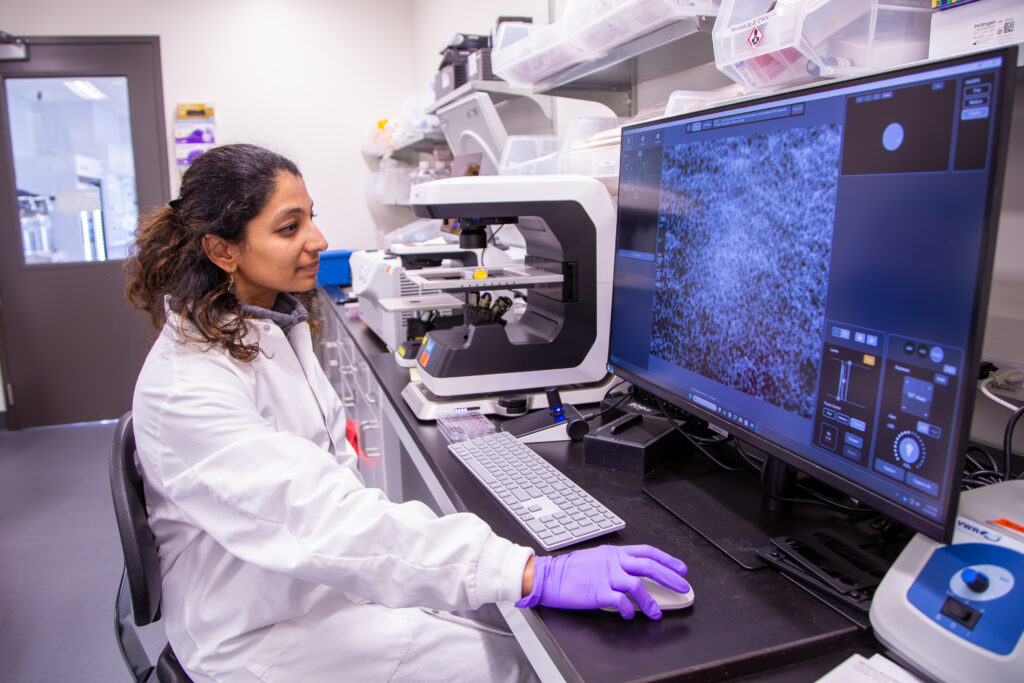SeaBridge Postdoctoral Fellowship Program – Request for Applications



Program Description
The ability to reprogram human cells has the potential to revolutionize diagnostics, therapeutics, and the entire biotechnology landscape. The Seattle Hub for Synthetic Biology (SeaHub) seeks to share this transformative technology across the Seattle biotech ecosystem, fostering scientific advancement and creating a dynamic environment for startup companies.
The SeaBridge Fellowship program offers two years of partial financial support, as well as structured career development, mentorship training, and networking opportunities. SeaBridge Fellows will work closely with mentors in the Seattle Hub for Synthetic Biology to learn and apply cell and genome programming technologies to basic research questions that can then be applied to translational research. In addition, SeaBridge Fellows will have the opportunity to integrate into the SeaBridge LaunchPad to learn the ins and outs of starting a biotech company in Seattle. Finally, Fellows will opt into either Entrepreneurial or Discovery tracks; we provide each track with training to support the Fellows’ desired focus.
For two years, SeaBridge Fellows will use cell programming technologies developed at the Seattle Hub for Synthetic Biology to advance their specific research interests. Fellows working with an investigator in the Seattle area are encouraged to apply. Fellows will collaborate with a Seattle Hub for Synthetic Biology scientist to learn and apply Seattle Hub for Synthetic Biology technology to their research questions in their postdoctoral lab. To learn about Seattle Hub for Synthetic Biology technology, check-out these publications.
SeaBridge Fellows will be required to take one course based on their selected research track of interest (Discovery or Entrepreneurial). Additional training opportunities include courses or seminars offered by the UW Foster School of Business, Creative Destruction Lab, and other organizations. Fellows will be strongly encouraged to attend networking events hosted by Seattle Hub for Synthetic Biology and by other institutions in Seattle to connect with industry scientists. Click here to view the specific course requirements and networking opportunities.
Fellows will be mentored by a Primary Advisor (their postdoctoral advisor) and a Secondary Mentor from Seattle Hub for Synthetic Biology (Seattle Hub for Synthetic Biology Mentor). Fellows will be matched with their Seattle Hub for Synthetic Biology Mentor within the first year of their funding and will meet at least twice a year.
SeaBridge Fellows will be required to attend a CIMER-based mentorship training in their first year of funding. Fellows are then required to mentor a postbaccalaureate trainee through the PROPEL Northwest program. SeaBridge Fellows and PROPEL NW postbaccalaureate trainees do not need to be in the same lab to be paired. SeaBridge Fellows will meet with PROPEL NW trainees to provide guidance on graduate school preparation and career advancement. Fellows can continue mentorship after 1 year or mentor multiple postbaccalaureate trainees. If interested, SeaBridge Fellows can participate in curriculum development and implementation of workshops for the PROPEL NW program.
Each Fellowship provides approximately 50% stipend support for two years ($50,588 Year 1, $53,001 Year 2) plus an additional $10,000/year for research and career development (i.e., supplies, classes, networking events) and $2,500/year to support conference attendance and travel.
SeaBridge Fellows will have the opportunity to gain start-up biotech experience by attending LaunchPad project planning meetings and contributing to projects such as market research and pitch design.
Applicants should have no more than 36 months of postdoctoral research experience at the time of the application.
Ph.D. candidates that do not have their degree at time of the application deadline are eligible to apply. If awarded, the applicant’s Ph.D. degree must be conferred prior to the start of the Fellowship.
Applicants do not have to be U.S. citizens.
Applicants will automatically be excluded from consideration if they do not meet the following criteria:
- Proposal does not include Seattle Hub for Synthetic Biology technology.
- Applicant host PI already has a fellow embedded in the lab within 12 months prior to the potential applicant’s start date in the SeaBridge Fellowship.
- Applicant has more than 3 years of postdoctoral experience.
In Year 2, SeaBridge Fellows who wish to continue their work, deepen their integration with the LaunchPad, and have their project considered for a ‘core’ LaunchPad initiative, are encouraged to apply for a third year of funding. Fellows approved for a third year must participate in Year 3 mentoring and training. Extension RFAs are available upon request from the SeaBridge Fellowship Director. Fellows are required to meet with the Executive or Fellowship Director and their postDoc advisor(s) before applying to assess eligibility beyond Year 2.
Application Information
Applicants must propose a project that utilizes the technology and aligns with the goals of Seattle Hub for Synthetic Biology.
Detailed Instructions for Application:
- CV or NIH-style Biosketch. Provide a PDF of your CV/Biosketch that includes current and pending support (amount, title, short description). No page limit.
- Personal Statement (1-page limit) Note, we specifically would like a statement on why you are interested in this Translational Fellowship and how your participation and proposed project will contribute to the Washington ecosystem.
- Proposed Research Project (2-page limit, including any figures or diagrams). Provide a narrative outlining the scientific premise and goals of the proposed research, how it advances your field and its broader impact on human health. Explain why technologies utilized by Seattle Hub for Synthetic Biology scientists are critical to the success of this work. If you are pursuing the entrepreneurial track, specifically discuss how engaging with the LaunchPad will support your career development. If you are pursuing the Discovery track, specifically discuss how applying cell and genome editing technology to basic research questions will support your career development as a potential academic scientist. References may be in any format.
- Letter of Recommendation from Ph.D. Mentor. (2-page limit): Provide a signed letter from your Ph.D. advisor.
- Letter of Recommendation from Postdoc Advisor/Mentor. (2-page limit): A statement of support for the applicant from the faculty advisor describing a) why they believe this candidate is the best applicant for this fellowship, b) why this specific funding mechanism and training opportunity is important for this fellow’s career development, and c) how the adoption of SeaHub science is critical for the success of this project. If applicants have two postdoctoral fellowship advisors, the applicant should provide a letter of support from their additional mentor.
Applicants must provide the application materials through the SeaBridge Fellowship Application portal on the SeaBridge website.
Timeline
SeaBridge Fellowship applications are accepted on a rolling basis on the SeaBridge website application portal. Applicants are encouraged to apply at least 6 months prior to their targeted start date in the program. The next application review cycle will begin March 31st, 2026.
Information session
Interested in learning more? Let us know that you are interested in learning more about the program by filling out this form. In addition, you can contact the SeaBridge Fellowship program by email at seabridgefellowship@uw.edu.